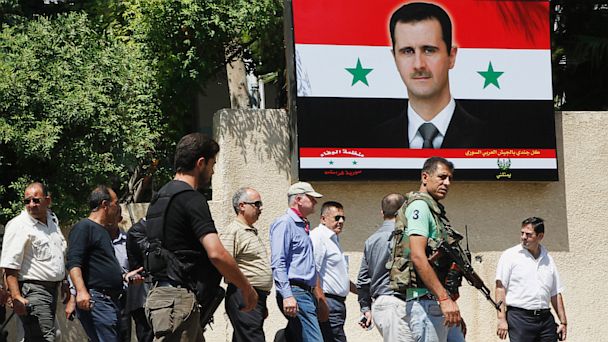Obama Faces Steep Climb to Win Congressional Support for Strike on Syria
WASHINGTON - During a rare briefing at the Capitol, on a holiday weekend no less, 83 lawmakers from the House and Senate cut short their five-week summer recess to attend a classified briefing from senior administration officials hoping to make the case to Congress to authorize a military strike on Syria.
With some members dressed in their summer casual attire - from T-shirts and blue jeans to clothing more common on the golf course than the storied corridors of the Capitol - lawmakers raced from the airport to make the hastily scheduled briefing, which was organized Saturday after the president said he would seek congressional authorization.
Syria Prepares For Possible Airstrikes: See the Photos
Congress will not vote on the war resolution until at least the week of Sept. 9, when both chambers return for legislation business, giving the White House a short opportunity to build the president's argument that the Syrian government's use of chemical weapons on its own people merits a U.S. military strike.

(Credit: Khaled al-Hariri/REUTERS)
But getting to 218 votes in the House, not to mention achieving a successful vote in the Senate, is clearly an uphill climb for President Obama to ascend. If the vote were taken today, several lawmakers intimated to ABC News that they believe it would fail.
"I'm not there yet," Rep. Janice Hahn, D-Calif., said after the briefing. "I am hoping to find an answer to the question, is there another way to hold Assad accountable?"
"There's a lot more questions I have to have answered," Rep. Elijah Cummings, D-Md., added. "I want to know exactly what the game plan is."
The Map of Alleged Chemical Attacks in Syria
Briefing Congress today were five of the president's foreign policy confidants, including Deputy National Security Adviser Tony Blinken, Deputy Director of National Intelligence Robert Cardillo, Under Secretary of State for Political Affairs at the Department of State Amb. Wendy Sherman, Under Secretary of Defense for Policy Dr. James Miller, and Director of Operations for the Joint Staff at the Department of Defense Vice Admiral Kurt Tidd.
Lawmakers also had the opportunity today to privately review classified documents and other pieces of evidence that have built the administration's case.
Many of the president's Democratic allies are opposed to military action - saying they don't dispute the chemical weapons but nevertheless are wary of rushing into another war by trusting a premise that could be based on uncertain intelligence.
"In that room today there was a lot of memories," Rep. Jim Himes, D-Conn., said, adding that there was a "great deal of skepticism."
Rep. Gerald Connolly, however, said that the during the classified briefing, which lasted more than 90 minutes, administration officials were "actually erring on the side of qualifying evidence to ensure they do not overstate it."
"The shadow of Iraq and the fiasco of the evidence, the very shoddy evidence of so called weapons of mass destruction in Iraq overshadows this situation," Connolly told reporters after the briefing.
In order to pass a vote for authorization, the president will need to construct an unusual alliance in Congress of Republicans and Democrats, most of whom were not eager today to come to the president's defense.
While Obama has said he will not necessarily obey Congress's vote and could act without its consent, only a few lawmakers questioned whether it was wise to seek authorization.
"I never felt the president had to come to Congress," Rep. Eliot Engel, the top Democrat on the House Foreign Affairs Committee said. "If Congress acts like the British Parliament [and rejects the vote on authorization], it would be an abdication of duty."
"Members are going to really wrestle with this in an honest way. The division on the issue does not break down necessarily on party lines," Connolly said. "Members understand the gravity of the situation and genuinely want to get into it as quickly as possible so that they are prepared when and if we have a resolution to consider."
The majority of members who spoke to the press after the briefing also complained that the administration's resolution is too broad and gives the president too much discretion for what has described as a "limited" and "narrow" strike.
"The biggest single concern among the members may very well have been a very broad request for authority with supposedly a very narrow intent to do anything and I think that has to be narrowed down in the next week," Sen. Roy Blunt, R-Mo., said. "At the same time, the limited willingness to do anything that would actually change events on the ground except discourage further use of chemical weapons is something that members, including me, are going to have to deal with whether or not that limited effort is worth the next step."
Blunt said that new language is more than likely to come about before Congress takes the vote.
"The administration is open on the language issue and I think they will have to be if they want to get their language through Congress," Blunt said.
Neither House Speaker John Boehner nor House Minority Leader Nancy Pelosi attended the update, although both have been in close consultation with the president in the last few days. A spokesman for the speaker said Boehner "is aware of all the relevant information."